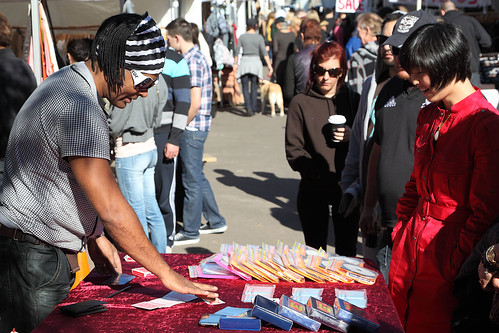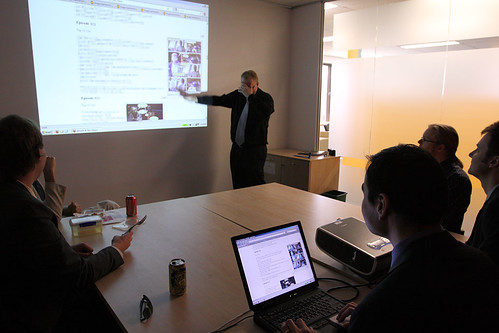

| Archive Blog Cast Forum RSS Books! Poll Results About Search Fan Art Podcast More Stuff Random |
|
Classic comic reruns every day
|
1 {photo of a man making cakes and pastries}
1 Caption: Find your Strengths
|
First (1) | Previous (3336) | Next (3338) || Latest Rerun (2895) |
Latest New (5380) First 5 | Previous 5 | Next 5 | Latest 5 Annotations theme: First | Previous | Next | Latest || First 5 | Previous 5 | Next 5 | Latest 5 This strip's permanent URL: http://www.irregularwebcomic.net/3337.html
Annotations off: turn on
Annotations on: turn off
|
 A team-building exercise at a business training course (not the one mentioned in the text) - building towers out of spaghetti and marshmallows. |
Many, I might even say most, of the other people selected to do this course were extremely cynical about it, and were not afraid to express it. "Useless feel-good Kumbaya rubbish," was one comment I overheard. This is what happens when you gather together a collection of highly intelligent and critical-thinking engineers and scientists and try to get them to go on a "business training" course. They imagined it would be full of meaningless buzzwords and platitudes to "work smarter" and that sort of stuff. My attitude is much more open to new things and new ideas, and I was willing to give it a fair chance.
The session was about positive attitude and optimism. It had actually been designed as an information session and support program for children suffering from cancer and their families. As you can imagine, that would be a stressful situation and one prone to lapsing into despair. To give these children and their families a better quality of life, the program aims to make them resilient to negative events, so they can maintain a positive outlook and enjoy life. I doubt even the most negative naysayers would argue that that was a bad thing. Anyway, the organisers realised this could also have value in a workplace environment, and exported their program to business seminars.
One of the basic ideas or techniques that we learnt is that often you can't control what happens, but you can control your reaction to what happens. As an example, you have to give a presentation first thing in the morning, but your bus to work is cancelled. You can either stew over it and curse your luck, and when you arrive and have to start your presentation half an hour late you're grumpy and ruffled. Or you can use the time to go over your presentation in your head a couple more times, and be calm and well-prepared when you arrive and start.
This example might sound trite, or even ridiculous. But when I stop and think about it, it makes sense. Why get angry or upset when (a) it won't help, (b) it makes me feel worse, and (c) I have much better things to do with my time? I know sometimes you can't help but get upset or angry about something in the heat of a moment. But you can recognise what's happening and take a conscious decision to find something else to do - distract yourself, go for a walk, whatever it takes to get your mind off it and onto something more worthwhile. I've taken the effort to do this ever since the seminar, and you know what? I'm happier and more productive, both at work and at home. Why on earth would I not do this?
That is actually a secondary point to the one I wanted to talk about when I began writing this. The main thing the presenters talked about to us at this training session is the idea of identifying and using your strengths. A strength, simply put, is something you are good at. Very often a strength is correlated with something you enjoy doing, because you tend to do things you enjoy and you tend to get better at things you do a lot. A strength is often something you pursue of your own accord in your leisure time. The idea in the business context of this training session is to take advantage of people's strengths.
 Pick a card. |
One interesting aspect of this was that we were doing it with people we knew in our office, so for some of the particular strengths some people were saying things like, "Oh, I know who this should go to," and seeking them out for a trade. Other people were desperately trying to get rid of some cards, because they represented things they didn't like and were no good at. And there were usually takers, willing to trade them for something else that the first person found more palatable.
Anyway, some of the strengths circulating around the room were things like:
 Pointing out something wrong in a meeting. |
Now consider a typical workplace. They like to train staff to do their jobs better. One common approach is to evaluate staff and find out what tasks they are not so good at, and give them training in those tasks. But here's the rub. If you're not good at something, then there's a high chance you don't like doing it much, and will try to avoid it as much as you can get away with. And training to do more of that task will just seem like some form of torture. Imagine training to maintain finance spreadsheets if you hate that and would rather talk to customers. Or conversely, imagine training to talk to customers if you hate that and would be much happier maintaining the spreadsheets.
If you're a boss and you're doing this, then you're training your staff to do exactly the wrong thing. You'll have a disgruntled customer relations expert crunching spreadsheets, and a spreadsheet guru trying to talk to your customers. Instead, you can recognise the strengths of the staff and make better use of those. Give the people person responsibility for more customer interaction, and the number cruncher responsibility for more spreadsheet work. And train them that way too. Your customer relations person can take a course in advanced sales - they'll probably enjoy it and end up an even better customer liaison. Send the spreadsheets person on an advanced finance course - they'll have a ball and become a financial wizard.
In hindsight it sounds almost obvious. Give people more of what they are good at and love to do, and less of what they suck at and hate. Everyone wins, the individual staff and the company! This sounded good to me, and since that session I have been applying it to my work interactions.
 A successful working team. |
Other members of my team, in contrast, have strengths in: writing computer code, researching relevant academic literature, making contacts with other staff or external people which can lead to fruitful collaborations, task tracking, constructively criticising new ideas to find practical ideas, and the heavy duty mathematics of working on our research topics. Rather than feel bad that I'm not so good at these things, I encourage my team members to take some of these tasks off my hands, while offering to help them with the things that I prefer doing. And I've noticed them doing the same thing with me - asking for my help on things that they know I'm good at, and offering to do some of the tasks they know I'm not so good at. As a working team, we end up being more efficient, more thorough (less procrastination and task forgetfulness), and happier.
To bring this back out of a work context, this can also be applied in other interactions, with family or friends. If you're in a group setting, let people do what they do best. In my group of friends who collectively write the comic Darths & Droids, one person is the "story guy", one is the "continuity guy", one is the "we need a better punch line" guy, one is the "this line is unrealistic, that character wouldn't say that" guy, and one is the guy who comes up with ridiculously wacky ideas of which some are really awesome. (There's some overlap, but you can notice the tendencies.) And being the facilitator, my job is to bring them all together to a common agreement on what we write.
For more solitary hobbies or leisure activities there's no real chance to share a workload around several people. But you can still apply a bit of thinking about your strengths. If there's something you like doing and you're good at, then go ahead and do it some more. There is definite satisfaction in attaining mastery over a skill and being able to do things with a high level of productivity and success. If you play music, then play more music. If you like cooking, then cook more.
Then there are some things that we like doing, but we're not very good at. Yet. If you like doing it, go ahead and do it - it's the only way to get better. I'm doing this at the moment with my drawing. I've always liked drawing, but have never been very good at it. I decided to give it a go and just do it more, so that I can develop my skills.
Everyone has strengths, whether they recognise it themselves or not. You have strengths, several of them. Take some time to think about what they are. Take a conscious step to recognise the things that you like doing and are good at. Try to arrange things so you get to do more of those. Try to recognise the strengths of the people around you, the people you work with, your friends, your family. Encourage them to do more of those things. Ask them for advice or help with their strengths, and offer your assistance with yours.
Do more stuff. Gain more strengths and improve the strengths you already have. Become a wizard at what you do. You never know where it may lead you.
|
LEGO® is a registered trademark of the LEGO Group of companies,
which does not sponsor, authorise, or endorse this site. This material is presented in accordance with the LEGO® Fair Play Guidelines. |